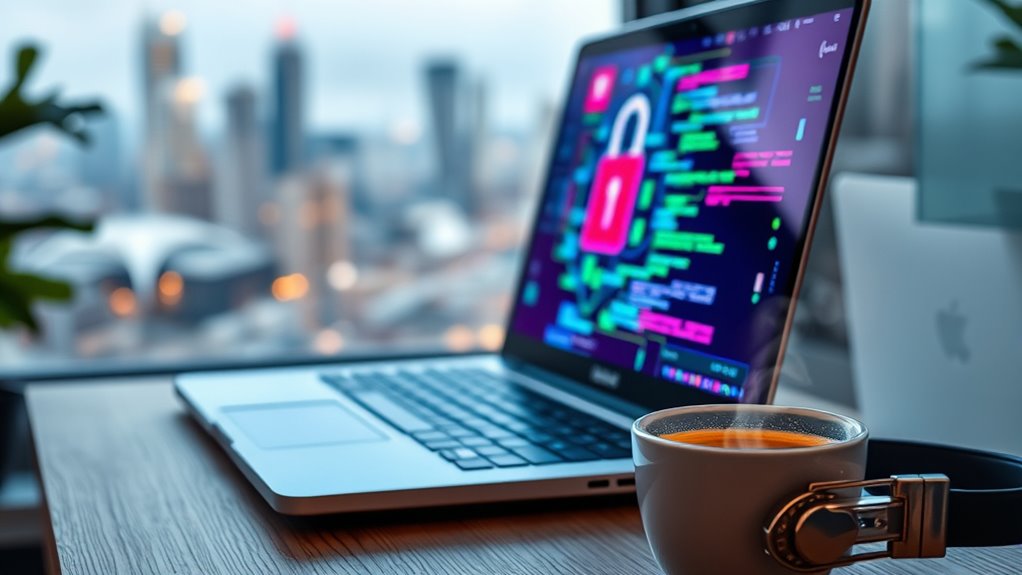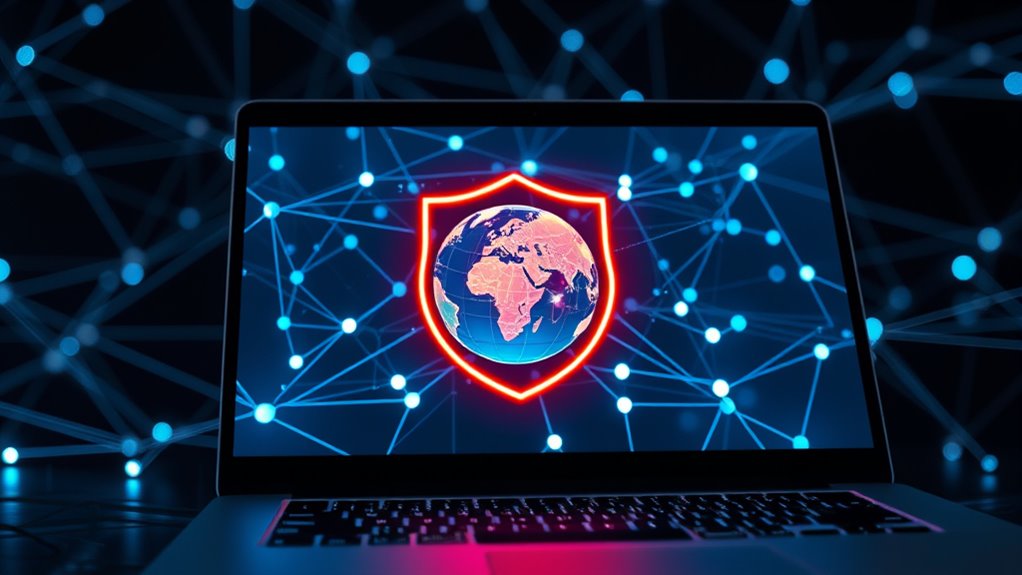VPNs secure your connection by encrypting your data, making it unreadable to outsiders, and masking your IP address for anonymity. This means your online activities, like browsing or streaming, stay private. With a VPN, you can also bypass geographical restrictions, giving you access to content that’s otherwise blocked. Plus, it protects you on insecure networks, like public Wi-Fi. Want to know more about the full benefits and features of VPNs? Keep exploring.
Key Takeaways
- VPNs provide a secure connection by encrypting data, making it unreadable to potential interceptors.
- They mask your real IP address, offering anonymity and preventing tracking by websites and advertisers.
- VPNs route your internet traffic through secure servers, protecting your data on public Wi-Fi networks.
- They allow access to region-restricted content by connecting to servers in different geographic locations.
- Using a VPN enhances online privacy, ensuring your personal information remains confidential during internet use.

Have you ever wondered how a VPN can enhance your online privacy? When you connect to the internet without a VPN, your data travels through various networks, making it vulnerable to prying eyes. This is where a Virtual Private Network steps in, acting as a shield around your online activities. By using a VPN, you can keep your personal information secure and private, ensuring that what you do online remains just that—private.
One of the key features of a VPN is its use of encryption protocols. These protocols convert your data into a code, making it unreadable to anyone who might intercept it. Imagine someone trying to read your messages but only encountering a jumble of letters and numbers. That’s the power of encryption! With a VPN, your internet traffic is routed through a secure server, so even if hackers or snoopers try to eavesdrop, they won’t be able to decipher your information. This level of security is vital, especially when you’re using public Wi-Fi networks, which are notoriously insecure.
In addition to encryption, VPNs also offer data masking. When you connect to the internet with a VPN, your real IP address is hidden behind the server’s IP address. This means that websites and online services won’t be able to track your true location or browsing habits. By masking your data, a VPN adds another layer of anonymity to your online presence. Whether you’re streaming content, shopping online, or simply browsing, you can do so without worrying about being monitored or targeted by advertisers.
Moreover, using a VPN can help you bypass geographical restrictions. If you’ve ever tried to access content only available in certain countries, you know how frustrating it can be. A VPN allows you to connect to servers in different locations, giving you access to content that might otherwise be blocked in your region. This makes it an essential tool for travelers and anyone who wants to experience the full breadth of the internet. Additionally, VPNs can enhance your experience by allowing you to access Halloween product reviews that might be restricted in your region.
Frequently Asked Questions
Can a VPN Help Bypass Internet Censorship?
Yes, a VPN can help you bypass internet censorship imposed by government restrictions. By connecting to a server in a different location, you can access blocked websites and content, enhancing your content accessibility. This way, you can freely browse the internet without limitations. Just remember to choose a reliable VPN service to guarantee your privacy and security while steering around these restrictions. Enjoy your unrestricted browsing experience!
Are VPNS Legal in All Countries?
VPNs aren’t legal in all countries; around 25% of the world’s population lives in areas with government restrictions on their use. In legal jurisdictions like the U.S. and Canada, they’re perfectly acceptable for personal and business use. However, some countries impose strict penalties for using VPNs, especially if they’re used to bypass censorship. Always check local laws before using a VPN to guarantee you’re compliant and avoid any potential legal issues.
How Do I Choose the Best VPN Service?
To choose the best VPN service, start by looking at the encryption protocols it offers; strong encryption keeps your data secure. Next, check the logging policies—opt for a service that has a strict no-logs policy to protect your privacy. Compare user reviews and consider factors like speed, customer support, and ease of use. Finally, test the service with a trial to see if it meets your needs before committing.
Do VPNS Slow Down Internet Speed?
Yes, VPNs can slow down your internet speed. It often depends on encryption protocols and server locations. When you connect to a distant server, your data travels further, which can lead to delays. Similarly, stronger encryption protocols can add processing time. However, choosing a high-quality VPN with optimized servers can minimize this impact. So, while you might notice some slowdown, it doesn’t have to be significant if you pick wisely.
Can I Use a VPN on Multiple Devices?
Yes, you can use a VPN on multiple devices! Most VPN providers offer multi-device support, allowing you to connect several devices simultaneously. Check your subscription plan, as some may limit the number of devices you can use. If your plan permits account sharing, you can even share it with family or friends. Just make certain you follow the provider’s guidelines to enjoy secure browsing across all your devices without any hassle.
Conclusion
In sum, using a VPN not only secures your connection but also enhances your online privacy. Imagine you’re traveling abroad and want to access your favorite streaming service. With a VPN, you can bypass geo-restrictions and enjoy your shows as if you were back home. By encrypting your data and masking your IP address, VPNs empower you to browse safely and freely, making them an essential tool for anyone who values their online security.









